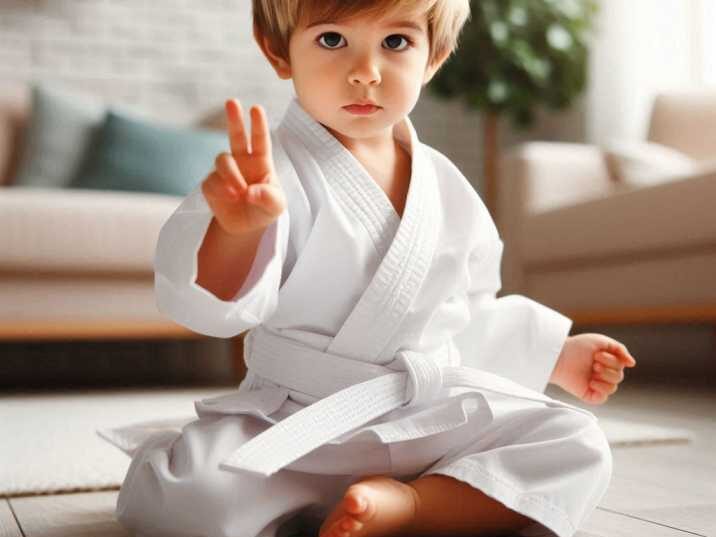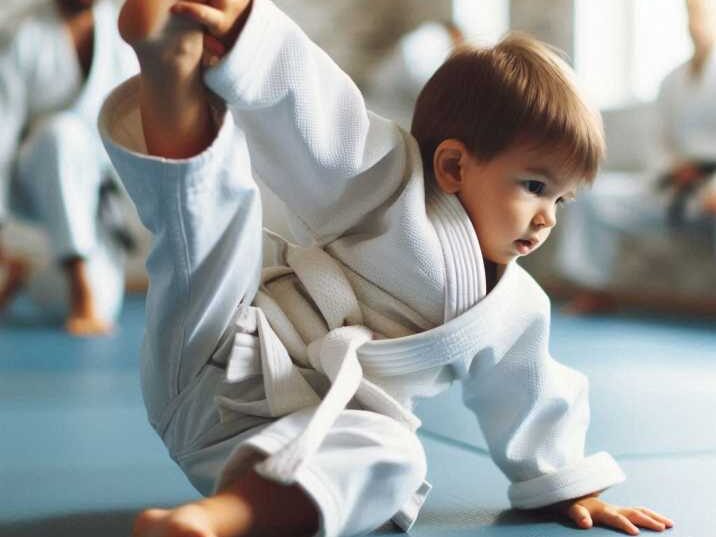Martial arts can be a great activity for toddlers, helping them develop skills like focus, discipline, and coordination while having fun. Many parents are looking for engaging activities that help their children grow both physically and mentally. Martial arts training can offer the perfect combination of these benefits. Whether it’s improving focus in school or building self-confidence, toddlers can gain a lot from starting martial arts at an early age.
In this article, we’ll explore the best martial arts for toddlers, and why they are such great options for young children. We’ll also cover the benefits of martial arts for toddlers, helping you decide which martial arts might be the best fit for your little one.

Table of Contents
Table of Contents
- Introduction
- Why Start Martial Arts Early?
- Best Martial Arts for Toddlers
- Taekwondo
- Karate
- Brazilian Jiu-Jitsu
- Judo
- Aikido
- Benefits of Martial Arts for Toddlers
- Physical Development
- Mental Growth
- Social Skills
- How to Choose the Right Martial Art for Your Toddler
- FAQs
- Conclusion
Why Start Martial Arts Early?
Starting martial arts at a young age helps toddlers in many ways. Training requires concentration and discipline, and these traits can be developed early on through martial arts. These skills don’t just stay on the mat—they also help toddlers with improved focus in school and other activities. Martial arts also offer a safe and structured environment for toddlers to burn off energy, build strength, and improve flexibility.
Best Martial Arts for Toddlers
Here are some of the best martial arts options for toddlers, each offering unique benefits:
1. Taekwondo
Taekwondo is a Korean martial art that focuses heavily on powerful kicks and fast footwork. Its emphasis on lower-body movements makes it a great option for toddlers who are just beginning to develop their motor skills. Classes designed for toddlers focus on simple techniques, such as basic kicks and stances, that can be easily understood and practiced by young children.
- Key Benefits:
- Improves leg strength: Taekwondo’s focus on kicking helps toddlers strengthen their leg muscles, which is essential for their physical growth.
- Balance and coordination: The controlled kicking and footwork in Taekwondo teach toddlers how to maintain balance, an important skill for their early development.
- Body control: By practicing precise movements, toddlers improve their overall coordination and ability to control their bodies in space.
- Best Age to Start:
- Toddlers as young as 3 or 4 years old can start Taekwondo. At this age, they are developing coordination and focus, and Taekwondo can help them build these skills in a fun and interactive way.
2. Karate
Karate is one of the most popular martial arts globally, It focuses on punches, strikes, and defensive movements, making it a well-rounded martial art that teaches both offensive and defensive skills. For toddlers, Karate is simplified into basic techniques like straight punches, blocks, and basic stances that they can practice repetitively.
- Key Benefits:
- Boosts self-confidence: As toddlers learn and master basic moves, they gain a sense of achievement that boosts their self-esteem.
- Teaches self-control: Karate stresses respect for others and controlling one’s emotions and actions, which is crucial for young children as they learn to navigate social interactions.
- Instills discipline: The structured environment of Karate classes helps toddlers understand the importance of discipline, listening to instructions, and following rules.
- Best Age to Start:
- Karate is ideal for children starting at around 4 years old. At this age, they are beginning to grasp the concept of self-control, and Karate can further enhance these skills.
3. Brazilian Jiu-Jitsu (BJJ)
Brazilian Jiu-Jitsu is a martial art that focuses on grappling and ground fighting techniques. It’s less about striking and more about using leverage and body position to control an opponent. This makes BJJ ideal for teaching toddlers how to use their minds along with their bodies to solve problems. The emphasis on technique rather than brute strength helps toddlers understand that strategy is just as important as physical ability.
- Key Benefits:
- Develops strategic thinking: BJJ’s grappling nature requires toddlers to think about how to position themselves and escape from difficult situations, fostering their problem-solving skills.
- Increases flexibility: BJJ movements stretch the body, improving flexibility, which is important for young children as they grow.
- Builds resilience: Toddlers learn to get back up after falling and keep trying, building both mental and physical resilience.
- Best Age to Start:
- BJJ can be introduced to toddlers as young as 3 or 4 years old. At this age, they can start learning simple grappling techniques that don’t involve much force but still teach them the importance of strategy and patience.
4. Judo
Judo is another grappling-based martial art, but it focuses more on throws and takedowns. It teaches toddlers how to safely fall and throw their opponents without causing injury. Judo emphasizes using an opponent’s force to your advantage, making it a martial art of leverage and timing rather than brute strength. For toddlers who are full of energy and love to be physically active, Judo can be a fun way to channel that energy constructively.

- Key Benefits:
- Enhances coordination: Judo requires a lot of body coordination, as toddlers must time their movements perfectly to execute a throw or avoid being thrown. This can significantly improve their sense of body awareness.
- Builds strength: Judo techniques require core strength, and repeated practice helps toddlers build muscles without realizing they’re exercising.
- Teaches body control: Judo’s emphasis on throws and falls requires toddlers to develop a keen sense of how to control their movements and understand how their body works.
- Best Age to Start:
- Judo is often suitable for toddlers aged 4 to 5 years. At this age, children are typically ready for the physical demands of Judo and can begin to understand the concepts of balance and control.
5. Aikido
Aikido is a Japanese martial art that focuses on using an opponent’s energy against them. Unlike some other martial arts, Aikido emphasizes non-aggression and encourages practitioners to defuse situations without causing harm. For toddlers, this makes Aikido a gentle and effective martial art that teaches them how to protect themselves while avoiding unnecessary conflict. Aikido movements are circular and flowing, which helps toddlers develop coordination and calmness.
- Key Benefits:
- Promotes calmness: Aikido teaches toddlers to stay calm under pressure and not to react aggressively, which is a valuable skill for managing emotions.
- Improves coordination: The smooth, flowing movements of Aikido help toddlers refine their motor skills and develop better coordination.
- Focuses on self-defense: Aikido’s emphasis on defense rather than attack makes it an excellent choice for teaching toddlers how to protect themselves without resorting to aggression.
- Best Age to Start:
- Aikido is typically best for toddlers who are around 5 years old. By this age, they are better able to understand the non-aggressive philosophy of Aikido and can start practicing basic defensive techniques.
Benefits of Martial Arts for Toddlers
Martial arts offer numerous benefits for young children, helping them grow physically, mentally, and socially.
1. Physical Development
Martial arts help toddlers improve balance, coordination, and flexibility. The structured movements and exercises help develop muscle control and overall fitness. Toddlers also build strength and endurance through regular training sessions.
2. Mental Growth
Martial arts encourage discipline and focus, which are essential skills for toddlers as they begin school. The mental challenges of learning new techniques can improve problem-solving skills and help children stay focused in class.
3. Social Skills
Being part of a martial arts class teaches toddlers the value of teamwork and cooperation. They learn to follow instructions, respect their peers, and work together in group activities. This can help with social development and building friendships.
How to Choose the Right Martial Art for Your Toddler
Choosing the right martial art for your toddler can depend on several factors, including their personality, physical abilities, and interests.
- Consider your child’s energy levels: If your child has a lot of energy and enjoys being active, a martial art like Taekwondo or Karate might be the best fit.
- Look for a supportive environment: Make sure to visit the martial arts school and see how instructors interact with the toddlers.
- Start with trial classes: Many martial arts schools offer trial classes, which can help you decide if the martial art suits your toddler.
Conclusion
Martial arts are a fantastic way for toddlers to develop both physically and mentally. From improving balance and coordination to learning discipline and respect, martial arts offer numerous benefits that can help toddlers grow into confident, well-rounded individuals. When choosing a martial art for your toddler, consider their energy levels and interests, and look for a supportive environment where they can thrive. Starting martial arts early is a great way to give your toddler the tools they need to succeed in life.
FAQs
1. What is the best age for toddlers to start martial arts?
The best age for toddlers to start martial arts is around 3-4 years old. At this age, they can begin to follow basic instructions and develop coordination.
2. Is martial arts safe for toddlers?
Yes, martial arts is generally safe for toddlers as long as they are in a structured and supervised environment.
3. Can martial arts improve my toddler’s focus in school?
Yes, martial arts training requires concentration and discipline, which can translate into improved focus in school and other activities.
4. How often should toddlers train in martial arts?
Toddlers can start with 1-2 classes per week. This ensures they get enough practice without becoming overwhelmed.
5. Do toddlers need special equipment for martial arts?
Some martial arts, like Taekwondo and Karate, may require uniforms (gi) and belts. Other martial arts may have minimal equipment requirements.


